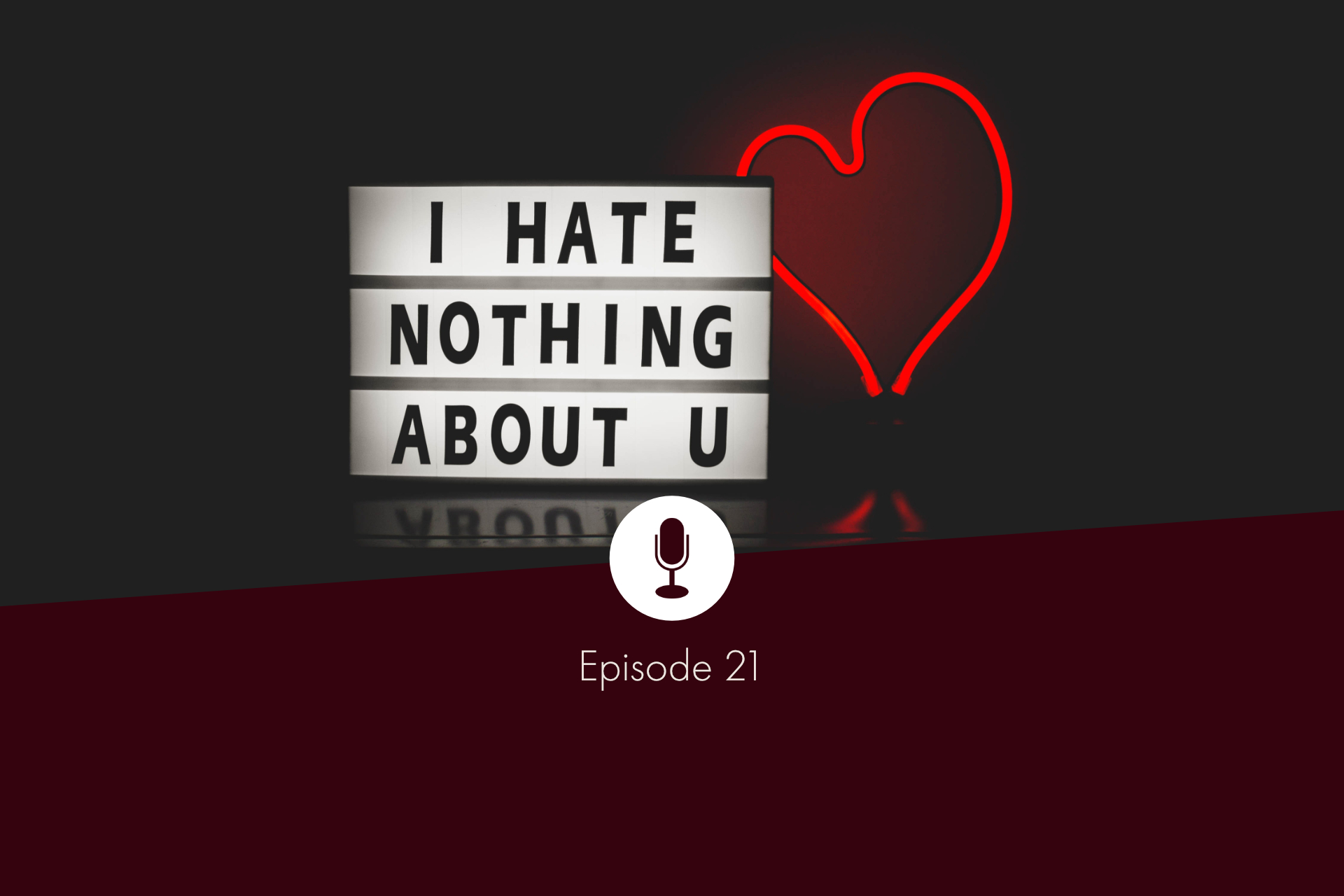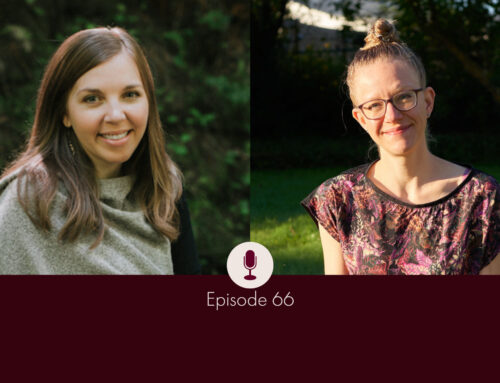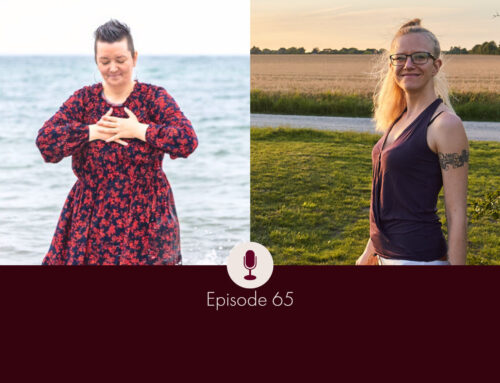From a young age we’re taught that the body is a thing that needs to be controlled and to look for quick-fix solutions like a pill or surgery to get rid of uncomfortable symptoms. Today I share why your body isn’t the enemy, and why we need to go deeper.
Subscribe on your favourite podcasting platform:
Apple Podcasts | Spotify | Google Podcasts | Amazon Music
We have this narrative in our society that the body is a wild thing that needs to be controlled (and if you can’t it’s somehow your own fault). Today I share how your body is actually trying to support you and keep you alive as best as it can with the means it’s given.
I dive into:
- why a lecture on PCOS and obesity really activated my sacred rage
- a rant about the Western medical industry and how doctors fail to look at underlying root causes of dis-ease (which is a systemic problem)
- why “reduce your weight” is a superficial answer to a deeper (societal) problem
- our societal sugar addiction and toxic load
- why your body is in fact your greatest supporter in life
Ressources I mentioned:
Podcast Episode “Are you taking care of your body or are you having a relationship with her?”
I didn’t mention it, but charting your cycle can be a meaningful first step to start building this relationship, so go to my resource on cycle charting to learn more: Cycle Charting
Book a Connection Call or get in touch via email.
Hey, hello and a good morning or a good day, good afternoon, good evening, whatever time of day it is for you, but for me it’s morning. So I wish you a good morning and a warm welcome to the first episode of my relaunched podcast, Womb Whispers, which was formerly Spirals of Life. It was a necessary change and I’m very very happy with how it all evolved and came together and unfolded.
And I’m super excited to bring this first episode to you today, which is all about this message that your body isn’t against you, your body isn’t your enemy. We are often almost led to believe that our body is our enemy, but it is not. It is your supportive ally that actually tries anything it can to keep you safe and supported in life.
But before I dive into why I want to talk about this, I give you a quick cycle check-in because that’s what I do here on the podcast as often as I can remember. So I’m on my day 29 of my cycle, which is in my deep inner autumn phase, and today I feel energised and rage-y.
And the reason why I love this so much is that it so fits, you know, because the inner autumn, which in case of a menstrual cycle, it’s the luteal phase, and if you don’t have a menstrual cycle, then it’s the waning moon phase.
This is our truth-speaking time. It’s this time where we are really connected to what’s true for us, what’s ours, and what isn’t for us, what’s not working for us. We can see that more easily. And it also is a time where many difficult emotions come up that we are able to suppress throughout other times and phases of our cycle. But often in our autumn is when all of that comes up.
And one important thing for me personally, but I know for many women and people socialised as women in this society is rage. And I definitely feel my sacred rage on, absolutely. So this is really fitting together nicely with the phase I’m in with regards to my cycle.
And so what happened is that yesterday I attended a lecture from a doctor on PCOS and obesity, basically the relationship between PCOS and obesity. And I was listening and I could feel myself get angrier by the minute. I wasn’t sure why exactly, but since then I’ve made sense of a lot of things that got me activated.
The case study they presented was of a 14 year old girl with PCOS. And in case you don’t know what that is, PCOS is polycystic ovarian syndrome and it means that even though it has cysts in its name, it means that the follicles, the bags that contain the eggs that ripen in the ovaries every month, they can’t mature because there is too little estrogen and too much testosterone in the body. So these can’t mature and they appear like little bubbles around the ovaries. And one of the symptoms is that these people either don’t have cycles throughout the year or very little, like one or two cycles per year, so one or two ovulations and menstruations per year. It’s quite a common thing by now, that’s on the rise.
And this case study that was presented was of a 14 year old girl who had quite a high weight for her height and everything and the doctor’s suggestion was to reduce weight because the weight reduction, yes, it helps and it helped for that girl to get her period back. Even quite a regular one, and it included some other lifestyle changes, I believe.
And then after some time that doctor met with the patient again to find that she had gained weight in the meantime again, because it was hard for her to keep the weight down.
And yeah, apart from weight reduction as the main goal, needing to try everything to do that, the questions that were asked with regard to that presentation were “What kind of birth control pill can I subscribe my patient?”, “How is this medication and how much of that medication would you give?” “And what kind of surgery would be best to help them reduce their calorie intake? Is it better to have a stomach band or a stomach bypass?”, et cetera, et cetera.
Now, why are we just trying to have a quick fix? Just take a pill and everything is fine. Why don’t we look at the underlying issues that are at play here? It was a little surreal that everyone was just about “What pill can I give them? What surgery? How can we reduce their calorie intake? How can we help them develop the strong willpower and motivation to keep the weight down?”
And just to make that clear, I don’t want to dismiss the modern Western medicine. Not at all. It has its right. It’s just not everything. And I also understand that doctors, at least here in Germany, but I guess elsewhere too, they work in a system that makes it really difficult for them to treat the person in front of them. So they instead look at the pathology, they look at the symptoms, they look at the diagnosis, and then they try their best with the little time and the little resources they have to give a quick solution. Because time is money. That’s a narrative in our society.
And I understand that, you know, they are doctors, their patients want solutions, their patients expect them to know and to have a solution for them, if possible a quick solution that works by simply taking a pill or some form of nutrient. And all of this is really a societal and systemic problem that I might address another day. And that probably comes through in most of what I share anyway. But this is not the specifics of what I wanted to get into here.
So there are basically two things that really got me enraged. And I could clearly decipher one already yesterday, which is that I believe just looking at weight reduction isn’t addressing the deeper problem. The weight itself isn’t the problem.
And it was so interesting that these doctors, they mentioned that insulin resistance is something that’s present in, or was present in that case study at least, but is present in many clients or patients with PCOS. But no one was asking why the insulin resistance was there in the first place. And you know, it’s not about reducing weight, but about reducing the insulin resistance. And those are two completely different things.
And I will dive into insulin resistance and what that means in a moment, but what triggered me even more, and that’s what I only found this morning, was that they said it’s so hard for that client to maintain the lower weight, because according to them, the body always strives for the weight it came from. It wants to go back up because of survival mode and wanting to build up buffers for hard times.
There is some truth in that. They were like, “Yeah, of course the body is always trying to get to a different weight, get back to get back up, get the weight back up.”
And you know, it totally feeds into this idea, and that’s what I was so furious about, that our body is something to fight against, that it does something we don’t want it to do. And it’s almost like a child in its defiance phase, or I think in English you say the terrible twos or something. So when they first start saying no and saying no a lot, and this narrative is in our society that our body is something that’s the enemy basically, that wants something or does something that we don’t want, in this case gain weight. And it brings us up one against another, us against our body, to see us separated from the body. We are our body, we are not separate.
But this narrative causes this deep, deep disconnect and feeds the body hatred and body shame so many experiences. And it also brings up this shame because it tells us that we are supposedly not able to tame it and keep the body in check. So it puts the fault on us. We are doing something wrong and not managing to tame our body. And that’s why then the weight goes back up. And this kind of narrative and disconnect from our body causes so many women and people socialised as women in the society to absolutely hate their body because they think they have to fit in some kind of norm and they struggle against their body.
And just for the record, I do know that there are men and people socialised as men who struggle too and I don’t want to deny that, but the majority is women and people socialised as women. And with my own history of anorexia and orthorexia, I know what I’m talking about. I know this deep hatred or even just not understanding and standing in front of an unknown. You don’t know what’s going on in your body. We are not taught what’s going on in our body.
And let me tell you this: Your body isn’t your enemy. Your body has no intention whatsoever to fight against you. It is not trying to behave in a mean or hurtful way. It’s not even trying to behave in a defiant way. But we have this narrative that our body is this animal needs to be tamed. A wild thing.
It’s not. Your body is actually trying to support you and keep you alive as best as it can with the means it’s given. And I just say that because looking back at my life, my body never failed me, however little food I gave it. And I’m really, really grateful for it. And at times it had to go by on very little food and a lot of exercise. And while I’m not proud of it, I now know that it’s not my fault in that sense, because I live in a society that instills these beliefs in us.
And you know, your body always strives for healing. It’s called homeostasis and it’s this balance between the different processes that are going on in the body because you don’t know it, but there are so many processes your body is taking care of day by day by day. And it’s always striving for this balance, this healthy balance. If it has the right conditions then it will always strive for this balance.
And if you’re interested in building a relationship with your body, I have a podcast episode on how you can get in touch with your body and also a little bit of how I did that in my personal journey, because I want you to have a supportive relationship with your body. And I will link to that in the show notes.
But I really want to drill this down: Your body is your supportive ally.
Which means that I have two problems with what the doctor said yesterday, because to me as I shared, they didn’t address the underlying factors. And I want to go deep, so I want to know what’s the cause, what’s at the root, basically.
And so the first one is that I don’t believe reducing weight is the issue here. It’s about addressing the underlying insulin resistance. And just for the record, 50 to 80% of PCOS cases have insulin resistance.
What insulin resistance means is, so insulin has one job which is to get sugar from the blood into the cells, because your cells will make fuel from it and keep you alive. And this process obviously also lowers the blood sugar. And insulin resistance means that the insulin can’t do its job properly anymore, because the cells just won’t absorb the sugar. They won’t let it in.
And so what the body tries is to produce more insulin in the hope that some of the insulin is going to work and bring the sugar into the cells. And so it’s almost like a devious cycle. More insulin leads to more hunger, leads to more eating, leads to even higher blood sugar, then the body has to produce more insulin because it’s still trying to get the sugar out of the blood and into the cells.
And in that lecture they did address that there is insulin resistance, but interestingly enough they never asked why.
I did, you know. Because, well, also because that’s things that are interesting to me and that I’m fascinated with, the way our society is structured. But something that I have thought about recently a lot is our sugar addiction. You know, like insulin resistance is already present in six year old children. Why don’t we ask why six year old children already have insulin resistance?
And I have a few examples. First one is that my best friend when she had her first baby and was unable to breastfeed him, she was advised by the doctor, luckily we must say, to only give the little one the pre-milk and never switch to one of the further ones, because then there is one for three months old and one for six months old and one for twelve months old. And that doctor said please just give the pre-milk because all the others just have more and more sugar added. That’s basically most of the difference.
Then another fact that I learned is that children’s sweets have more sugar in them than adult sweets. So we are kind of trying from the get go to get people into a sugar addiction. Is that really it? So why do we wonder why young children have insulin resistance then?
Like this sugar roller coaster and this addiction is very, very prevalent in our society. And you know, to me it feels a little deliberate because who benefits? More sugar leads two more diseases leads to more pills prescribed, so Big Pharma and the Medical Industry, they benefit. But definitely not the people.
Interestingly enough, in the case study, what they did wasn’t just saying reduce weight or reduce calorie intake. What they did was addressing the insulin resistance, they just didn’t make the connection for the client. Like, sometimes just understanding makes it more accessible and keeps up the motivation. Because what they told the client, it was a suggestion to pair a wholesome diet, so reducing or eliminating processed foods, using whole grain foods instead, lots of vegetables and fruit, and also combining that with movement.
And I really loved that because it was not about “just restrict the calories”, it was about making conscious food choices for healthier options as often as you can. And that’s definitely something I’m all for. So they actually addressed the insulin resistance, but they didn’t point it out, so I’m not sure if they either didn’t recognise it or if they did but just didn’t point it out. But to me that’s something, that’s what we need to know. It’s about the insulin resistance and trying to get that addressed.
And then the other thing that I got so angry about and that I had a problem with is that the doctor basically perpetuated this belief that it’s so hard to keep the weight at a healthy level. While to be honest, healthy depends on the body too, right? Like a healthy weight is different for different bodies.
And to me I think it’s much more helpful to understand the underlying process of why the body stores this excess fat in the first place instead of saying “Oh the body is just trying to get back to this higher weight.” asking “Why does the body store the fat?”
It’s the body’s way of getting rid of toxins when the liver isn’t able to cope with the toxic load anymore. So it’s actually your body helping you to stay alive. Again, it’s not fighting you.
We live in a world where we are bombarded with all kinds of toxins. It’s in the food we eat, think of pesticides and vegetables and fruit and fruit juice and whatever derived products we have, antibiotics in meat, the heavy metals in fish and other things, toxins in the cleaning materials we use at home. There are toxins in the hygiene products we use, toxins in the skin care products we use, and the liver is the main organ in charge of detoxifying the body. But at some point it just can’t keep up with all this toxic load. And of course the sugar isn’t helping either.
So if the liver is unable to get the toxins out of the body, they will be stored in fat cells. Because then at least they are not in the bloodstream or other organs anymore. That’s why the liver does this trick of storing it in fat cells where they can’t do more harm to the body. So in my opinion it’s simply not true that the body wants to go back up to a certain weight. It’s about the fact that storing toxins in fat cells is just its only way to get rid of the amount of toxins coming into the body on a daily basis if the liver is overwhelmed. And you know, if that’s not supportive of your body, I don’t know what is. It just tries to keep you alive.
Which doesn’t mean we shouldn’t do something about it and reduce the toxic load that we are exposed to. I just want to say it’s not just your fault. And I say that because again, that’s so often the narrative. It’s your fault, you can’t tame your body, you don’t have the willpower to keep your body weight straight. And what if it’s not that? What if that’s not the problem?
What if it’s actually us living in very toxic environments for our body? I can’t say it enough. Your body is trying to do the best and keep you alive and healthy with what it has, with whatever means it has. And the symptoms are the way the body tries to talk to you, or to us. And it’s our job to listen. It’s our job to seek understanding of these deeper underlying issues and address those.
Because if weight reduction was the only problem, so to speak, then it would have worked, right? And the client would have no trouble, really. But there are underlying causes that are systemic very often. So it’s not the client’s fault, which doesn’t mean they don’t have the responsibility to do something about it. They can, there are means, they can do something.
But symptoms are how your body talks to you. And if you seek understanding of what’s going on underneath all of that, and start addressing that, your body will love you for it and strive for this balance that I talked about, this homeostasis. Because when we create a healthy environment for your body, for your cells, or a healthi-ER environment, then guess what? The body strives for healing.
Yeah, I find that really fascinating. I believe in the capability of our bodies. And yeah, they are our friends. Your body is your friend. And if you do happen to have PCOS and you want a different solution than “Reduce your weight., “Take a pill.” or “Go and have surgery.”, then please know that I can help you. I have a program called Happy Healthy Period, a natural and holistic way of addressing your whole system, your body, your heart, your mind, your soul, so that you can learn to team up with your body and support these detoxification processes. For example, through deep lymphatic work, which will help your liver detox, relaxation techniques because stress is a major contributor to all of this overwhelm happening in the body and in the liver too.
And to nurture a loving relationship with your body. Again, I will link to that podcast episode where I talk about having a relationship with your body, because your body really isn’t against you. And if you happen to have PCOS and want a natural and holistic solution, reach out, let’s have a chat.
Apart from that, if you have any questions or insights or anything you want to share with me, please reach out, get in touch. I’d love to hear. And if not, I hope you’re taking something out of this and I wish you a lovely day and much love.
Sign up for Mo(o)nday Musings,
and receive my free personal e-letter to start your week with some soul-infused musings and support in your personal cycle (whether you menstruate or not):
and sign up for Moonday Musings!






